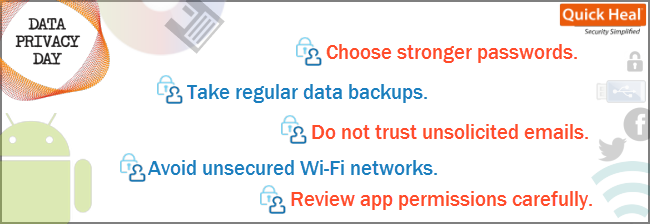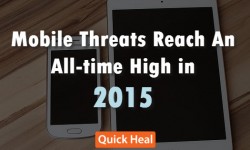Data Privacy Day – Tips to Protect Your Data and Privacy
Last year, if our readers can recall, we had an interesting discussion on Data Privacy Day (DPD) and also shared some useful tips on how to keep our data safe. Well, we are here again. To refresh our memory, DPD is observed across the world with a centered approach towards respecting privacy, safeguarding data, and enabling trust. And with this thought in mind, we have outlined some useful tips to protect your data and privacy on the Internet.
Tips to Protect Your Data and Privacy On the Internet
#1. Things you share on the Internet can stay there forever. Be thoughtful about what you post online about yourself or your friends.
#2. Share your full name, date of birth, phone number, address, etc., only if necessary, for your online accounts. If a skilled hacker has enough information about you, then they can open bank accounts in your name and commit other such crimes to steal your identity.
#3. One of the greatest threats to privacy and data are phishing attacks. Any unknown or unexpected communication (email, call, SMS, etc.) that requires you to act immediately and asks for your personal information should be treated as a phishing attack. Always ignore such communications and report them to the right authority.
#4. Consider using the 2-step verification for your online accounts. This prevents unauthorized users from getting access to your accounts and their data.
#5. Never trust links or attachments in emails from unwanted or unexpected sources, particularly if such emails are about your online bank accounts.
#6. Banking or shopping online using free, public WiFi networks can allow hackers to steal your personal and financial information. Always use secure networks for such activities, including logging in to your social media account.
#7. Protect your data with passwords that have a mix of uppercase and lowercase letters, numbers, and special characters.
#8. Before installing any mobile app, review its permissions carefully. Know what type of information on your device the app requires access to. If a simple flash light app requires access to your Internet, contacts, media files, etc., then avoid installing it.
#9. Always password protect your mobile device, tablet, and laptop. Being smaller and compact, such devices are more vulnerable to theft. Prefer using PIN or Password security feature.
#10. If you store any sensitive data such as passwords, bank account details, social security number, etc., in external storage devices, ensure that the data is encrypted.
#11. Always keep different passwords for different online accounts. This will ensure the safety of your other accounts, even if one of them is hacked or compromised.
#12. Protect your important data by taking regular backups.
#13. Data Privacy Day also presses the need to delete sensitive data securely. Data deleted even by ‘Shift+Del’ can be retrieved using data recovering tools. So, to prevent this know how to delete your data securely.
#14. Spyware is another threat to your data and privacy. These software monitor your activities, and record your data without your consent. Ensure that your PC has anti-spyware protection in it. Risk of a spyware infection can be avoided by turning on pop-up blockers, and downloading free software only from verified publishers.
#15. Knowing how a website uses your personal information is also an important step to protect your data and privacy.
#16. Always log out/sign out of websites once you are done, especially when you are using a public or shared computer.
#17. While shopping, banking or paying bills online, ensure that the website’s URL begins with “
“https://” and is accompanied by a locked padlock symbol.
#18. Avoid checking ‘Remember me’, ‘Remember password’, ‘Keep me logged in’ boxes.
#19. Many mobile apps can locate your whereabouts to serve you better. If you think such services are invading your privacy, then turn OFF location-tracking services on your device.
#20. Tighten your Facebook privacy settings to ensure that others see only what you want them to see. Check out these easy tips.
#21. WhatsApp now provides better security for your text messages. However, there is a lot you can do to ensure that your data and privacy over WhatsApp stays safe. Read our post on this.
#22. Block unauthorized storage devices from copying personal or sensitive data from your system. Quick Heal Data Theft Protection can help you with this.
UPDATED: This post is updated as of January 28, 2015.
References:
www.staysafeonline.org
www.its.ms.gov
www.privacyassociation.org


27 Comments
I FOUND IT GOOD USING QUICK HEAL. IT IMPROVED MY LAP TOP SYSTEM PERFORMANCE.
Cool Stuff
Best
thanks for all the useful information about internet…
Nice thing
GOOD & EFFECTIVE INFORMATION FOR ME BECAUSE I HAVE NO BASIC FUNDAMENTAL KNOWLEDGE REGARDING CYBER SAFETY.
THANKS. Samar Kumar Gupta. KolKata. West Bengal. India.28.1.2014.
good suggestions.
We very much thankful to you for providing/sharing such a important tips. will please let us inform how we can rid off software downloaded once unknowingly on mobile or laptop.
Much better for all thefts protection software
Automatically antivirus got uninstalled from my PC.
How do i can trust that Quick Heal can provide me batter Security for my PC.
Hi Navneet,
Are you referring to Quick Heal that got uninstalled from your PC automatically? We would request you to kindly get in touch with our support team at 0-927-22-33-000. You can also raise a query at https://www.quickheal.com/submitticket.asp. Our support team will get back to you to resolve the issue you are facing.
Regards,
I thank the Lord for you folks at Quick Heal Technologies! I thank you again and again for your useful information concerning protecting private data on the internet! Wouldn’t want anyone to get tangled up inside the Worldwide Web. Only Spider Man should do that!
Thank you again for your quality time.
We very much thankful to you for providing/sharing such a important tips. will please let us inform how we can rid off software downloaded once unknowingly on mobile or laptop.
Hi Sumit,
If you think you have unknowingly downloaded any software on your computer or mobile, then run a scan with your antivirus software.
Regards,
Rajib
Thanks. 😀
very good. Useful.
Thanks for all the useful information about internet
Cool Stuff
Best
Thanks
Nice thought
Thanks……………
there is not any system in quick heal to know about the details ranking of websites
Hi Rahul,
You can refer to sites such as http://www.alexa.com or http://www.sitescore.com for such details.
Regards,
This app is good .
Very simple useag.
I am a quick heal user from past 2 years and it has not dissapointed anytime. But I really want Quick Heal to reduce this statistics..
Thanks
Thanks!Very informative as well as it has to be followed fully.7